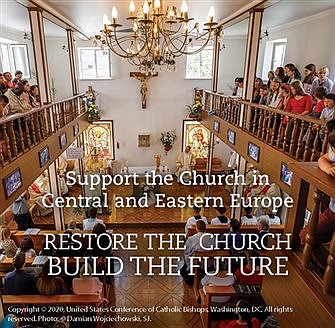Ash Wednesday collection for Central, Eastern Europe
February 10, 2021 at 9:47 p.m.

The collection will take place in most parishes on Ash Wednesday, Feb. 17. Those unable to attend Mass in person are encouraged to contact their local parish for giving options, including online donations.
Following the collapse of the Soviet Union in 1991, countries in Central and Eastern Europe have been laboring to rebuild religious life as well as governments, social welfare activities and economies. Catholics of that region endured decades of religious persecution under Soviet rule, and are in urgent need of help.
Each year the Collection for Central and Eastern Europe helps to support seminaries, youth ministry, social service programs and pastoral centers, as well as church construction and renovation in 28 nations once under communist control.
Kyrgyzstan, an impoverished nation compared to Switzerland for its beauty, was used as a Soviet gulag. Brutal communist dictator Joseph Stalin inadvertently revived the Catholic Church there when he used it as a prison for ethnic Poles and Germans who were deported from western Russia for refusing to abandon their faith.
In 2020, the Subcommittee on Aid to the Church in Central and Eastern Europe awarded $6.1 million in funding for 323 projects in 25 countries.
Related Stories
Wednesday, October 23, 2024
E-Editions
Events
The collection will take place in most parishes on Ash Wednesday, Feb. 17. Those unable to attend Mass in person are encouraged to contact their local parish for giving options, including online donations.
Following the collapse of the Soviet Union in 1991, countries in Central and Eastern Europe have been laboring to rebuild religious life as well as governments, social welfare activities and economies. Catholics of that region endured decades of religious persecution under Soviet rule, and are in urgent need of help.
Each year the Collection for Central and Eastern Europe helps to support seminaries, youth ministry, social service programs and pastoral centers, as well as church construction and renovation in 28 nations once under communist control.
Kyrgyzstan, an impoverished nation compared to Switzerland for its beauty, was used as a Soviet gulag. Brutal communist dictator Joseph Stalin inadvertently revived the Catholic Church there when he used it as a prison for ethnic Poles and Germans who were deported from western Russia for refusing to abandon their faith.
In 2020, the Subcommittee on Aid to the Church in Central and Eastern Europe awarded $6.1 million in funding for 323 projects in 25 countries.










